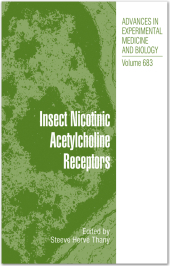 Neuerscheinungen 2016Stand: 2020-02-01 |
Schnellsuche
ISBN/Stichwort/Autor
|
Herderstraße 10
10625 Berlin
Tel.: 030 315 714 16
Fax 030 315 714 14
info@buchspektrum.de |

Steeve Hervé Thany
Insect Nicotinic Acetylcholine Receptors
Herausgegeben von Thany, Steeve Hervé
Softcover reprint of the original 1st ed. 2010. 2016. xix, 118 S. 6 Tabellen. 254 mm
Verlag/Jahr: SPRINGER, BERLIN; SPRINGER NEW YORK 2016
ISBN: 1-493-95153-X (149395153X)
Neue ISBN: 978-1-493-95153-6 (9781493951536)
Preis und Lieferzeit: Bitte klicken
This book investigates insect nicotinic acetylcholine receptors. It explores the involvement of insect nicotinic receptors in learning and memory processes, using the honeybee as insect model. The book a will serves as a useful guide to the field.
The aim of this book is to summarize our understanding on the insect nicotinic acetylcholine receptors. This area of research received great impetus from the identification of the first subunit sequences to be used as neonicotinoid insecticide target sites. Although a book of this nature can provide the details only of commonly published results, it is hoped that it may provide a useful guide to the newcomer to the field as well as to point out some of the future challenges. For example, we need to determine the precise subunit nomenclature of insect nicotinic receptors. This nomenclature varies amongst species and this led to some of the early confusion that persists. We need to be precise in identifying the subunit composition of native insect nicotinic receptor subtypes, their functional properties and physiological roles.
Steeve Hervé Thany is an assistant Professor for Neurobiology and Neurophysiology at the University of Angers, France. Its research interests are in the areas of molecular biology, electrophysiology, pharmacology and behavioral processes involving insect nicotinic acetylcholine receptors. Recent research focused on the effects of neonicotinoid insecticides on nicotinic receptors and the intracellular mechanisms regulating their function. He is a member of numerous national and international scientific organisations, including the French Society for Neuroscience (SN) and the Federation of European Neuroscience Societies (FENS).


